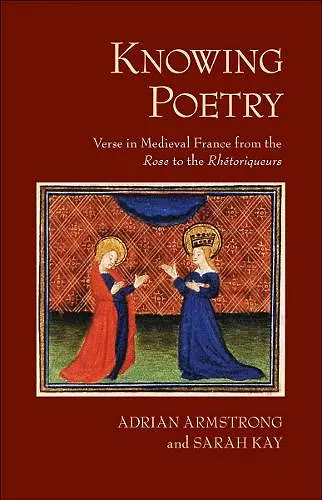Knowing Poetry
Verse in Medieval France from the "Rose" to the "Rhétoriqueurs"
Adrian Armstrong author Sarah Kay author
Format:Hardback
Publisher:Cornell University Press
Published:15th May '11
Currently unavailable, and unfortunately no date known when it will be back

In the later Middle Ages, many writers claimed that prose is superior to verse as a vehicle of knowledge because it presents the truth in an unvarnished form, without the distortions of meter and rhyme. Beginning in the thirteenth century, works of verse narrative from the early Middle Ages were recast in prose, as if prose had become the literary norm. Instead of dying out, however, verse took on new vitality. In France verse texts were produced, in both French and Occitan, with the explicit intention of transmitting encyclopedic, political, philosophical, moral, historical, and other forms of knowledge.
In Knowing Poetry, Adrian Armstrong and Sarah Kay explore why and how verse continued to be used to transmit and shape knowledge in France. They cover the period between Jean de Meun’s Roman de la rose (c. 1270) and the major work of Jean Bouchet, the last of the grands rhétoriqueurs (c. 1530). The authors find that the advent of prose led to a new relationship between poetry and knowledge in which poetry serves as a medium for serious reflection and self-reflection on subjectivity, embodiment, and time. They propose that three major works—the Roman de la rose, the Ovide moralisé, and Boethius’ Consolation of Philosophy—form a single influential matrix linking poetry and intellectual inquiry, metaphysical insights, and eroticized knowledge. The trio of thought-world-contingency, poetically represented by Philosophy, Nature, and Fortune, grounds poetic exploration of reality, poetry, and community.
"Does verse convey a different kind of knowledge than prose in the later Middle Ages? Yes and no, according to the authors of this erudite and entertaining book. Verse can convey knowledge as profound as does prose, but it does so differently: verse links the quest for knowledge to orality, performance, and personifications and thus invites its readers to engage in a different kind of epistemology: 'verse's ways of knowing.'." -- Renate Blumenfeld-Kosinski, University of Pittsburgh
"In the process of exploring the various institutions and contexts in which verse is produced from the late thirteenth century onward, Knowing Poetry makes a fresh and compelling case for the study of late medieval French. In a book that can function as a literary history of French poetry in this period, Adrian Armstrong and Sarah Kay offer a rich, complex examination of the textual traditions of late medieval verse." -- Marilynn Desmond, Distinguished Professor of English and Comparative LiteratureBinghamton University, author of Ovid's Art and the Wife of Bath
ISBN: 9780801449734
Dimensions: 235mm x 155mm x 22mm
Weight: 907g
264 pages